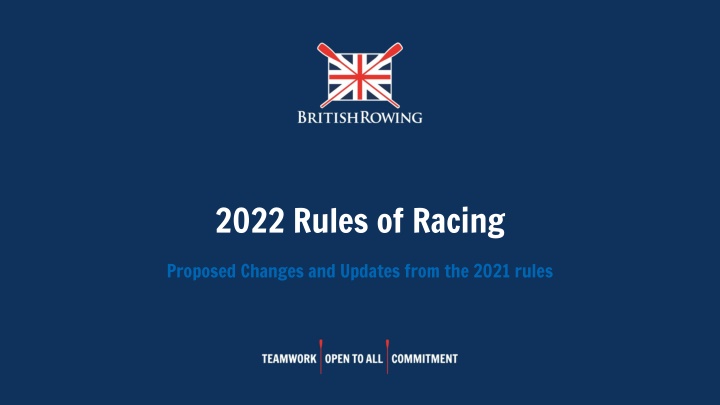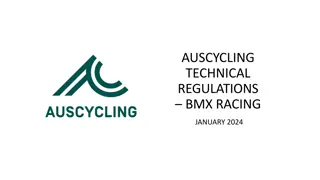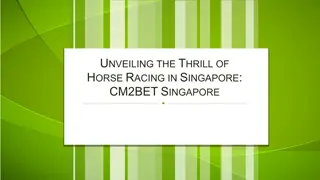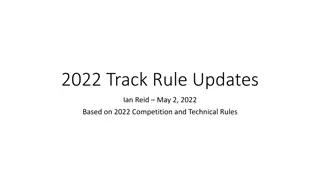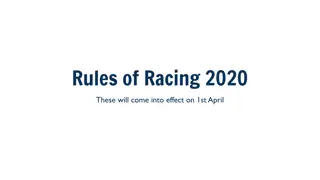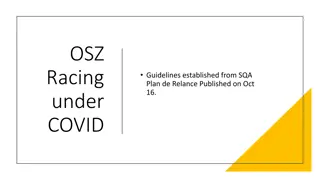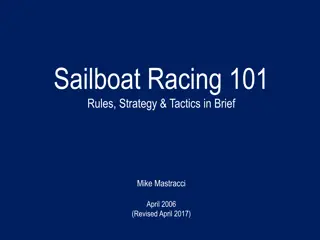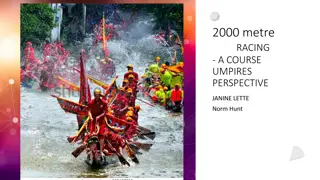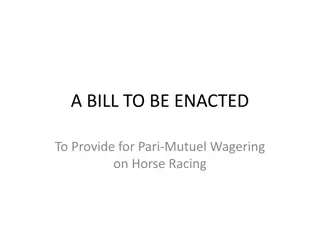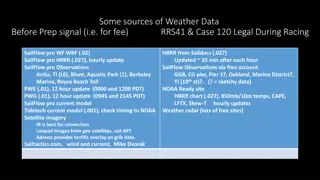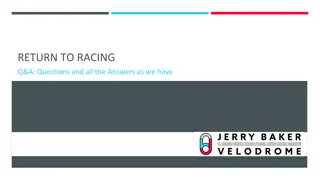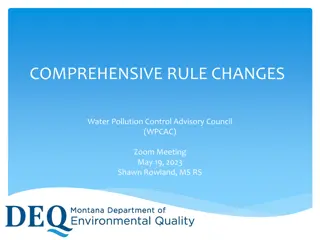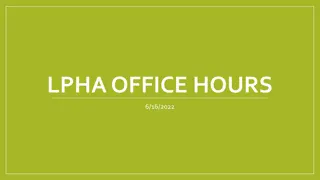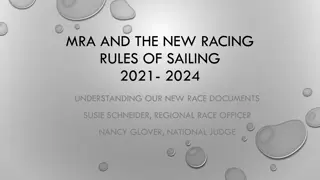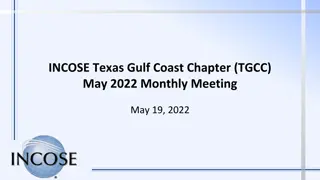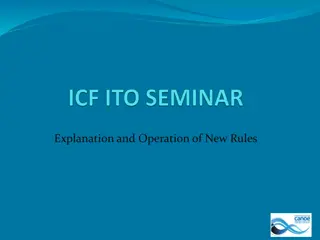Proposed Changes and Updates in the 2022 Rules of Racing
The 2022 Rules of Racing propose significant changes, including standardizing race time, simplifying the Masters handicap start procedure, updating start procedures in difficult conditions, and making major changes to offshore and beach sprint rules. New definitions for "May," "Should," "Shall," and "Caution" aim to clarify rule enforcement. Organizing committees are tasked with publicizing competitions following specific guidelines. Masters Handicap Starts see a preamble adjustment to align with other start procedures. The starter in Masters races confirms crew categories, handicap, and start order.
Download Presentation

Please find below an Image/Link to download the presentation.
The content on the website is provided AS IS for your information and personal use only. It may not be sold, licensed, or shared on other websites without obtaining consent from the author.If you encounter any issues during the download, it is possible that the publisher has removed the file from their server.
You are allowed to download the files provided on this website for personal or commercial use, subject to the condition that they are used lawfully. All files are the property of their respective owners.
The content on the website is provided AS IS for your information and personal use only. It may not be sold, licensed, or shared on other websites without obtaining consent from the author.
E N D
Presentation Transcript
2022 Rules of Racing Proposed Changes and Updates from the 2021 rules 1
Introduction The main changes are: Defined Shall, Should, May and removed Must throughout the rules Standardised on Race Time throughout Updated who needs to be informed about Notice of Competition Simplified the Masters handicap start procedure Updates to the Start procedure in difficult conditions Evasive action Major changes to the offshore and beach sprint rules. 2
New & Updated definitions May is used when alternatives are available Should is used when a provision is equally acceptable Shall is used when a provision is mandatory Caution a verbal advisory that the conduct of a rower or crew is in breach of the rules and may be taken into account when considering an Official Warning for a further breach of the rules. This would be an appropriate measure when the breach does not merit an Official Warning. Race time the time at which a race is scheduled to start. 3
5-5-1 Notice of Competition It is the responsibility of the competition s organising committee to publicise the competition. Any published material shall be shared with the local Regional Umpiring Committee in advance and shall note that the competition will comply with the British Rowing Rules of Racing. It is recommended the published material should also include the following: - the place, date and time of the competition - the events offered, their classification and the types of boats for each - the length and location of the course - any special restrictions or conditions, whether or not affecting the classification of competitors - the amount of the entry fees and when payable - the date and time at which entries close, and the date, time and place of the draw - the address for entries and correspondence and telephone number for enquiries. This includes announcements on social media! 4
7-3-4d Masters Handicap Starts The procedure during the start has not changed, only the preamble This brings it inline with the other start procedures The starter confirms the crews age categories, the handicap and start order This is a Masters Handicap race. Crews [..] you are Masters [..] and will start first, crew(s) [..] you are Masters [..] and will start second. Please confirm. The handicap is [x] seconds. Each crew is required to acknowledge that the information is correct. 5
7-3-4d Masters Handicap Starts The starter will still: use a stopwatch count down aloud, raise and drop the red flag for each go. The procedure is: Roll Call [Crew A Crew B] Attention Go [x-1] 1 Go 6
7-3-4 Starts 7-3-4i (Start of race) After a further distinct pause, the Starter shall give the start signal by saying: Go , simultaneously dropping the red flag smartly to one side. The pause between the raising of the flag and the start signal shall be variable. 7-3-4k (Poor conditions) In exceptional circumstances the Starter may omit the full Roll Call having previously told the crews Quick Start and replacing the Roll Call with All Crews 7
7-5-2 Lanes and stations A note has been added: Any crew is free to take evasive action to avoid being fouled without suffering disadvantage. The rest of the rule has not changed Each crew should remain on its proper course throughout the race and it should not: - encroach on the proper course of other competitors - interfere with other crews (see 7-5-5) - leave the limits of the course 8
Appendix F - Offshore Racing Lots of changes to simplify the rules and to make the visible finishing order closer to the actual finish order 4x+ minimum weight reduced Only one member of the crew needs to cross the line for beach finishes Course length is now recommended to be 4-6km Coxes and Crews are no longer able to view the course from a motor launch Competitors are not reminded that shelters may only be suitable at certain times! In floating starts the crews must be in the area 2 minutes (rather than 3 minutes) before The start procedure is the same as flat water racing Now requires the boat handling is to be safe and that the boat handlers are part of the crew Finish of the race updated to allow for an on-water or beach penalty area New umpire role of Penalty Umpire Penalties of 360 degree and 720 degree turns added as options 9
Appendix 2 - Beach Sprints Rules updated with experience from World Rowing and British Championships Only one style of course (slalom out and straight back in) Dangerous or out of control rowing can be penalised Umpire roles updated and reduced (Only 4 qualified umpires required) 10
Rules of Racing 2023 Rules of Racing are maintained by the Rules of Racing Panel as directed by the National Competition Committee Any comments or suggestions, please let the following know Chair of the National Competition Committee (Phil Clements) Chair of the Rules of Racing Panel (Christopher Anton) Consultation on the organisation of the rules will happen this year Suggestion to split into sections by racing type 11
